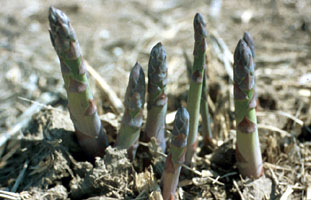Asparagus Spring Care

Asparagus is a well-loved vegetable and is one of the first signs of spring. This vegetable is a perennial and as such has some special care needs compared to most of the other vegetables that we grow in the garden. If properly cared for asparagus can be productive for well over 15 years. In the spring it’s important to clean out all the leaves, debris and other plant material that might be left over from last year. Weed control can be one of the biggest issues with an asparagus patch and spring is a vital time to prevent weed issues. If the spears haven’t started to sprout you can spray the area with a glyphosate product to kill any weeds and then go back over the area with trifluralin weed preventer granules. There are several products on the market that would work. No matter what product you use check the label to ensure that asparagus is listed as one of the plants the product is safe around. Whatever you do, don’t use salt to keep weeds down. That will damage the asparagus just as much as the weeds long term.
Asparagus typically can start being harvested in early to mid-April depending on the year and can be harvested for approximately six to eight weeks or till the spear size starts to decrease. At this point in time you should stop harvesting the asparagus and leave the remaining spears to grow for the rest of the summer. Similar to rhubarb, asparagus needs those spears and leaves to store food reserves for the next growing season so that the asparagus can be productive for years to come. After you have stopped harvesting for the season be sure to fertilize the asparagus bed using a balanced fertilizer such as a 10-10-10, 12-12-12 or something similar at the rate suggested on the bag.

